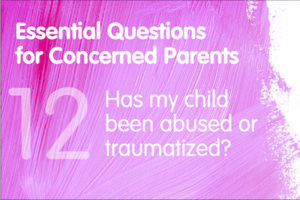 Trauma and abuse produce distress. Sometimes called “adverse childhood experiences,” even a single traumatic event, incident of abuse, or adverse childhood experience can cause difficulties in the moment and lifetime negative consequences.
Trauma and abuse produce distress. Sometimes called “adverse childhood experiences,” even a single traumatic event, incident of abuse, or adverse childhood experience can cause difficulties in the moment and lifetime negative consequences.
If the trauma persists, that makes matters worse; and if there are multiple adverse childhood experiences, like neglect piled on abuse or several bullies in the family, that also makes matters worse. The trauma, abuse or adverse childhood experience can occur in the home, at school, or affect whole communities, say when floods or earthquakes strike. And they can occur out of the clear blue sky, say if your child suddenly comes into close contact with a predatory priest, gymnastics coach, or other unidentified felon.
If your child comes home from summer camp and seems not to be his or her usual self, doesn’t it make sense to check in with him or her to see if something abusive or traumatic occurred at camp? Has there been a death in the family, the death of one of your child’s friends, or the death of a pet? Is your family life so chaotic as to rise to level of the traumatic? Has someone like a difficult ageing parent recently moved into the home? Looking at matters from your child’s perspective, might there be issues of abuse or trauma that he or she is trying to deal with (and maybe keeping secret about)? These are not pleasant matters to think about, especially if a family member is the culprit. But protecting your child from trauma and abuse is your duty.
*****
Read the Concerned Parents’ Project Introductory Post
To get in touch or to share your feedback, please email us
Read more on this topic
Interview: Parents Beware: Danger Ahead
Madness and the Family, Part III: Practical Methods for Transforming Troubled Family Systems
Visit Parent Resources for additional in-depth articles.














